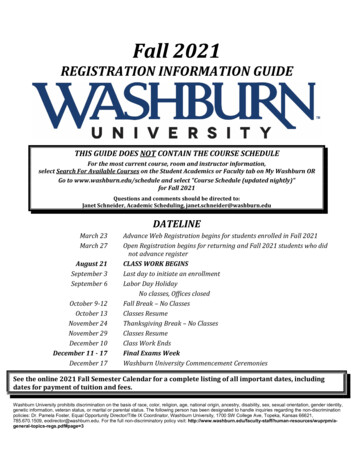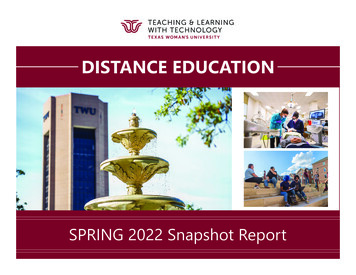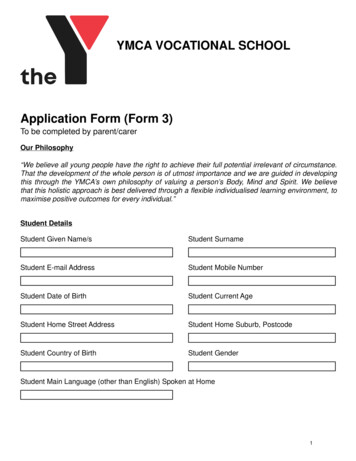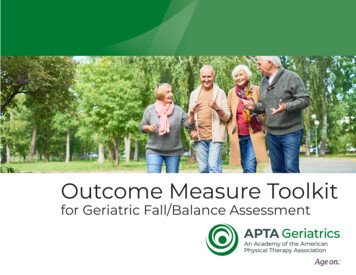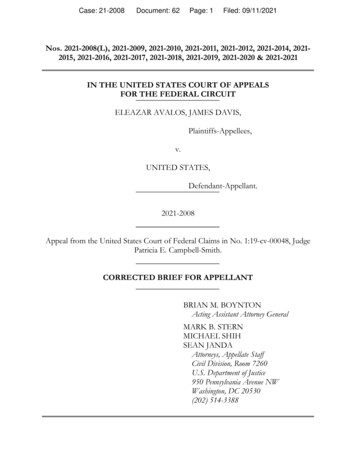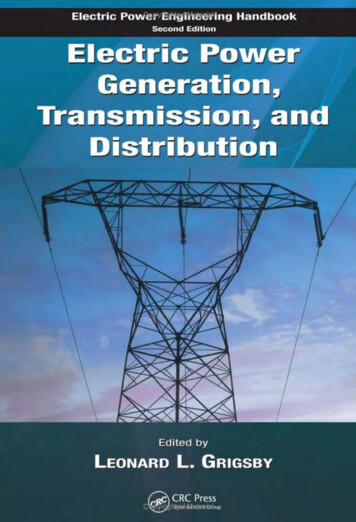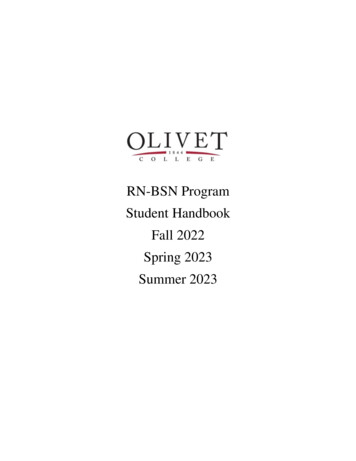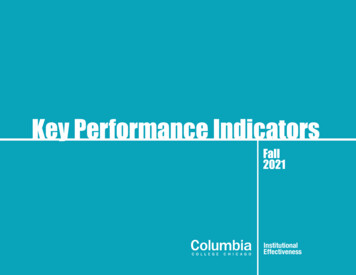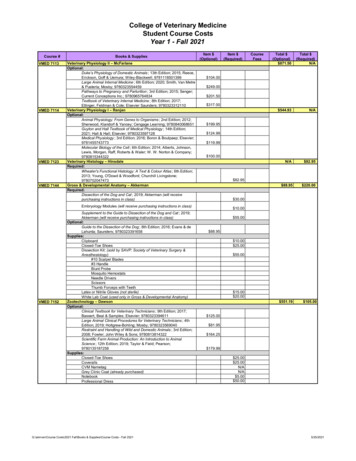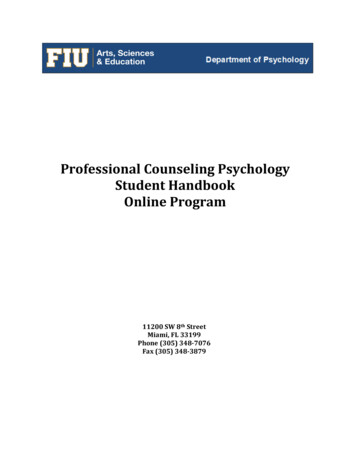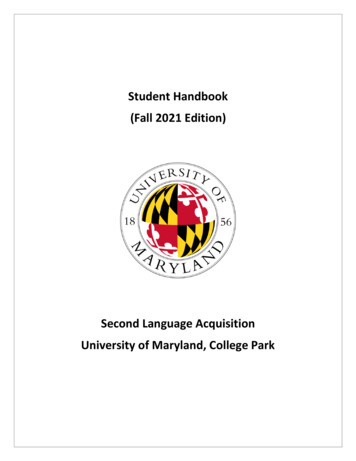
Transcription
Student Handbook(Fall 2021 Edition)Second Language AcquisitionUniversity of Maryland, College Park
ContentsI Advisor Assignment.3II Credits and Units .3III Program Description .3ABCDEFM.A. Program . 3Ph.D. Program . 4Course Description . 6Undergraduate Research: 498R (Second Language Research Practicum . 7Foreign Language Requirements .7Ph.D. Qualifying Papers . 8IV Thesis and Dissertation Research .9APh.D. SequenceFlowchart . 10V ConferencesABVI ResourcesABCD. 11Funding for Conference Travel . 11Recommended conferences . 13. 13SLA Lab and Equipment . 13Language and Science Center . 14University of Maryland Cognitive Science Colloquium . 15Library Resources and English Editing Service . 15VII Online Resources and Databases . 15ABCDEFTESTUDO . 15ELMS . 15UMD SLA Facebook Group . 16Linguistics and Language Behavior Abstracts (LLBA) . 16Non-SLLC GA-ships and Other Jobs on Campus . 16Library and Database Resources 17AppendicesABCDEFGLinks to Corpora Databases . 17Qualifying Paper Titles from 2010 to 2017 . 18Form 1: Specimen for Qualifying Paper/Dissertation proposal & defense . 19Form2: Thesis and Dissertation Documents . 20Form 3: External Dissertation Committee Member Nomination . 21Form 4: Employee Data Collection Form . 24Dissertation Proposal Defense Cover Page .252
HForm 5: Thesis/Dissertation Electronic Publication Form. 26I. Advisor assignmentThe initial (first semester) faculty advisor for new MA and PhD students is the SLA Program Director,unless otherwise specified. The initial advisor should be consulted about core courses and sequencing,especially in the first year of the program. All students are free to nominate academic advisors forqualifying papers (Ph.D.), dissertation committee supervisor roles, or for theses (MA). Note thatacademic advisors for the QP, thesis, and dissertation must be SLA graduate faculty, and that affiliatedfaculty can serve as committee members. Students should consult with their QP advisor and the SLAProgram Director if there are questions about affiliated faculty. For issues pertaining to GA-ships,conference travel, fellowship applications, and research funds, the SLA Program Director should beconsulted.II. Credits and UnitsThe International Student Scholar Services Office (ISSS) stipulates that an international student needs tocarry 48 units in order to retain full time status ew). Students with GA-ship are considered full time ifthey carry 24 units. International students may be able to establish part-time status with 36 hours, butshould be careful to check with ISSS first to make sure their visa status will not be affected. Theconversion of credits to units is as follows:600 – 897 courses 6 units per credit898 – 899 courses 18 units per credit799 12 units per creditAll students need to make sure they are carrying enough units to remain enrolled in their degreeprogram. Audits do not count in the credit to unit conversion.III. Program DescriptionsA. M.A. ProgramThe SLA program offers two tracks to the M.A. degree. Students may opt for the Non-thesis Track, whichrequires six core SLA courses and four electives. The electives should be from the SLA curriculum unlessapproved by the student’s advisor. This track is for students aiming for permanent or transitionalemployment after graduation from the M.A. program. For students considering applying for a Ph.D.program after a few years of teaching, the Non-Thesis track offers more coursework.Non-thesisTrackSem 1610611Sem 2630650ElecSem 3640ElecElec3Sem 4ElecElecTotal10 courses
The Thesis Track requires six core SLA courses, two electives and two thesis courses. The electivesshould be from the SLA curriculum unless the student petitions for replacing an SLA course with arelevant course offered in another program such as Linguistics, Psychology, or EDMS. Students in thistrack should aim to propose an original research thesis of publishable quality. The Thesis Track may beoptimal for students wishing to immediately apply for a Ph.D. program in SLA or Applied Linguistics upongraduation. Students opting for this track should discuss their plan with the SLA Graduate Director asearly as possible.Sem 1610611ThesisTrackSem 2630650Sem 3620640Sem 4ElecElecThesis799799Total10 coursesThe core courses for the M.A. tracks are offered to coincide with each M.A. cohort progressing throughthe program. It is very important for M.A. students in both tracks to take the required courses whenthey are offered, for if a course is skipped, it might not be offered again within two years.Students in either track are encouraged to participate in 649R, our weekly research critique seminar, atwhich student research and visiting speakers are featured. It provides a social opportunity for studentsto get to know each other and to get oriented to the field of SLA in general. The one credit option forthis is SLA 779.B. Ph.D. ProgramThe Ph.D. program requires two core courses in two SLA concentration areas and two electives. The fourareas of concentration are second language learning, second language instruction, second languageassessment, and second language use. The two core courses can be any two within each area ofconcentration. Two quantitative methods courses are also required of all Ph.D. students. These can beSLA 620, 630 or 760, or the EDMS courses. First semester Ph.D. students are required to enroll in SLA649R, research critique, and all students should enroll in 779, research critique, for 1 or 2 credits aftertheir first semester in the nt649R2 Courses in 2 Areas742740741750751754620Q630Q760Q74342 749EDMS647QEDMS722Q
4Use770771772773749EDMS621QEDMS655QPh.D. students can get credit for taking 600 level courses other than 610 and 611, which arefoundational core courses for the MA. Ph.D. students with SLLC GA-ship should consider carefully theirchoices in electives, for if they take SLAA 640 or SLAA 650 as electives, they may risk not having enoughcredits paid by the GA position to take 700 level courses later. For students who do not have an MA in afield related to the SLA domain, or who have not taken SLA courses before, it may be advisable to take610 or 611 in the first semester, although these two courses do not count as electives. This optionshould be discussed with the SLA Director in the first term of the student’s program of study in SLA.The Department of Educational Measurement and Statistics (EDMS) offers a series of quantitativemethods courses, from which the two required quantitative courses can be chosen. In the SLA program,SLAA 620, SLAA 630, and SLAA 760 all count for quantitative research course credits. For EDMS courses,there are prerequisites. 646- 651- 655 are in a sequence, as are 651- 647- 724. EDMS 657 is aprerequisite to 722. Ph.D. students should check with the SLA Director before committing to the EDMScertificate or other certificate programs on campus, as certificates require more coursework and morecredit hours than the SLA Fellowship will support and students may have to pay for them on their own.SLLC GAs in particular should plan their funding resources carefully, as the first year of the fellowshipprovides 10 credit hours for 20 hours of GA work; the second year provides 7 credit hours for 15 hoursof GA work, and the third year provides 5 credit hours for 10 hours of GA work in SLLC. Careful planningof course sequencing is essential.The SLAA 749 series courses are Special Topics seminars, and are denoted in TESTUDO with a suffix todifferentiate the content. Note that some 749 seminars often require permission of the instructor, socheck in advance.C. Course DescriptionArea 1LearningArea 2Second LanguageInstructionSLAA 610 Research and Theories Of SLA*SLAA 611 Fundamentals of Language Acquisition and Instruction*SLAA 640 PsycholinguisticsSLAA 650 Second Language AnalysisSLAA 740 Research Issues in Second Language LearningSLAA 741 Cognitive Processes in Second Language LearningSLAA 742 Second Language ProcessingSLAA 743 Interlanguage StudiesSLAA 744 Age Effects/Maturation ConstraintsSLAA 749 Special Topics in Second Language LearningSLAA 750 Instructed SLASLAA 751 SLA Classroom ResearchSLAA 754 Task Based Language TeachingSLAA 759 Special Topics in Second Language Instruction5
Area 3Second LanguageAssessment andResearchSLAA 620 Second Language Research MethodologySLAA 630 Second Language Testing and AssessmentSLAA 760 Research in Second Language AssessmentArea 4Second LanguageUseSLAA 770 Sociolinguistics in Second Language AcquisitionSLAA 771 Developmental and Cross-Cultural PragmaticsSLAA 772 Bilingualism and MultilingualismSLAA 773 The Heritage Language SpeakerSLAA 649R is our program’s weekly seminar class where students canpresent their Qualifying Paper proposals and defenses, Ph.D. dissertationproposals (not defenses), conference papers, works in progress, and/ortalks on issues and/or research methods and/or recent publications in SLA.SLAA 649R is usually held on Thursday nights in Jimenez Hall from 5:00 to7:30 pm.All Ph.D. students should be enrolled in SLAA 649R. For first-year Ph.D.students, this should be a 3-credit course enrollment. For second semesterand beyond Ph.D. students, enrollment in SLAA 779 may be for 1 credit. Allstudents (Ph.D. and MA) are welcome to present, regardless of their yearin the program. Beginning from their second year, all Ph.D. students arerequired to present at least once a year during 649R. MA students are notrequired to enroll in the course for credit, but are encouraged to come andparticipate in the weekly seminar.649RSecond LanguageResearch CritiqueSign-ups are through the faculty instructor for 649R that semester. Theslots in the last two or three weeks each semester are usually high indemand throughout the semester, mostly since students’ initial choices ofearlier dates were overly optimistic resulting in a need to postpone. Whenrequesting a date, ask yourself: “Will I really be ready by then?” Will mycommittee members have had two weeks to read the paper beforehand,and the committee chair additional time before that?” If you don’t putsome pressure on yourself, you will not be ready before the very last slotof the term comes along.Socializing after 649RAfter SLAA 649R, some of the students and faculty in the program often goout for dinner. Sometimes the restaurant will be within walking distance,but other times, we have to hop into a few cars to get there. Everyone(MA, Ph.D., and faculty) is welcome to join and encouraged to do so. Thisweekly 649R is our best chance to get to know one another, talk aboutpossible research partnerships, and build a support network in ourprogram.D. Undergraduate Research: 498R (Second Language Research Practicum)6
SLAA 498 is offered on a semester-to-semester basis. Ph.D. students are welcome to sign up as Ph.D.graduate supervisors and work with undergraduate students who are interested in Second LanguageAcquisition.The course is designed to offer undergraduate students a unique research experience in the area ofsecond language acquisition. Select students will work as Undergraduate Research Assistants (UGRA) tohelp conduct research on a variety of research topics (e.g., “Individual Differences in Second LanguageAcquisition”, “Implicit and explicit learning of a second language”, “Heritage language learning”,“Second Language Processing”, etc.) A specific research topic can be determined with the Ph.D.graduate supervisor.As an outcome of the course, students will gain knowledge in a particular second language acquisitionarea, be able to understand the relationship between data and hypotheses, learn how to set up anexperiment, create experimental stimuli, and analyze data using analytic software.UGRAs can register for 2 credits (8 hours/week) or 3 credits (12 hours/week). Students will be selectedbased on their application materials (resume, cover letter, name of a reference as well as nextsemester’s schedule) and their explicit motivation to work in a research lab. Evaluation factors that gointo assigning a grade include effort, attitude, quality of work, and participation over the course of thesemester. For more information about the course in general, please contact Dr. Kira Gor atkgor@umd.edu.E. Foreign Language RequirementBefore graduation, all SLA PhD students must demonstrate three types of experience with secondlanguage learning: learning a non-native language, proficiency in a second language, and teaching asecond language to non-native speakers of that language. All three types of experience or ability will beverified through official documentation and/or assessment. The three requirements do not have to bemet in the same language.1. Language LearningPhD students must have two semesters of college-level non-native language learning in a classroomenvironment (6 credit hours, minimum), verified through transcripts. SLLC will provide instruction forPhD students who need it.2. Language TeachingPh.D. students much have taught a second/foreign language to non-native speakers of that language forat least 1 semester, or the equivalent of 45 hours verified through contract, letter, etc.3. Language ProficiencyPhD students must demonstrate that they are able to communicate in a second/foreign language at aminimum level of proficiency (intermediate-low on ACTFL). An OPI can be used to fulfill thisrequirement. Students whose native language is not English will be able to satisfy this requirement withTOEFL or IELTS.7
F. Ph.D. Qualifying PapersEach Ph.D. student is required to complete two qualifying papers of publishable quality. Full time SLAPh.D. students should aim to propose the first qualifying paper topic by the end of their fifth semester inthe program. Qualifying papers that involve original data collection require an IRB (Institutional ReviewBoard) approval. Once a plan has been discussed with the QP advisor, steps must be taken to clear theIRB process before any data can be collected from participants. The topic of each qualifying papershould be negotiated with the QP advisor. The SLA program strongly recommends that the two QPs beon different topics, and ideally should involve different research methods so that the student developsexpertise in a range of research designs and analysis methods.The QP needs to be ratified through a process of nominating a QP advisor among the SLA graduatefaculty, the drafting of a QP proposal and discussion with the QP advisor prior to nomination of a QPcommittee, comprised of three faculty members. Students should consult with their QP advisor beforeasking affiliated faculty or non-UMD faculty to join the committee. Once a committee is formed, thestudent is required to defend the QP proposal. QP proposal defenses are normally scheduled in SLA649R (Research Critique), and must be preceded by a written proposal and distributed to the QPcommittee at least ten days before the scheduled defense.The oral defense of the proposal is followed by a revision, based on comments and suggestions arising inthe defense process. Once students have received the comments, the document is revised with therequested changes incorporated. Once the QP advisor is satisfied that the revised proposal is sufficientlyrigorous, the student should continue with the planned research and should not modify the agreedupon focus, design, or analysis without consultation with the QP advisor.Once the QP project has been written, a final defense must be scheduled. QP defenses are normallyconducted at the SLA 649R (Research Critique) venue and are open to all students. The student presentsthe main findings of the research in a conference-like setting and responds to questions and commentsfrom the committee members and from those in attendance. The committee convenes immediatelyafter the oral defense and provides a summary of suggested changes to the QP document. The studentis then obliged to resubmit the revised QP to the advisor within about two weeks, and the advisor willfile the signed attestation by the committee that the QP project meets the established standards. Atemplate for the QP and dissertation defense is in Appendix C (Form 1). The signed documents will gointo the students file maintained by the SLA program director. A sample of Qualifying Paper titles is inAppendix B.QP and Dissertation Research FundsA Ph.D. student conducts an empirical experiment, he/she may use up to a total of 3000 for paymentsto study participants. It will be up to the individual student to decide whether the funds are to bepartially used for the QPs, or saved for the main dissertation data collection. In the event a studentchooses not to use the research funding for QPs, the following options can also be pursued: a) design adetailed study and execute a quantitative analysis with archived or simulated data; b) conduct anexhaustive literature review and conduct a quantitative meta-analysis; c) do a micro-analysis ordiscourse analysis of recorded interaction from classrooms, proficiency interviews, etc. d) execute a8
detailed needs analysis of language use in a specific setting. PhD students should also consider othersources of research funding from ARHU (Arts and Humanities College), the Language Science Center,special grants from journals such as Language Learning, and research grants from Educational TestingService.Doctoral students may enroll in SLA 888 (Doctoral Independent Study) or SLA 898 (Pre-CandidacyResearch) while they are working on the second qualifying paper, after consultation with the QP IIadvisor. For students who have completed their second QP and are either writing a dissertationproposal or are writing the dissertation, it is extremely important to confirm that you are enrolled in SLA899 (Dissertation Research) for 12 credits. The Graduate School will drop any PhD student who is notenrolled in SLA 899 in the six months prior to their graduation date.After the second qualifying paper has been successfully defended, the student should file foradvancement to candidacy by filling out the form available from the Registrar’s l.umd.edu/files/uploads/application for admission to candidacy.pdf). This form needs to be signed by the student’s academic advisor and the SLA ProgramDirector before being filed in the SLLC office. The SLLC administrator will make copies and forward theform to the Graduate School.IV. Thesis and Dissertation ResearchIt is important to remain enrolled in the program after the second qualifying paper has been completed.In the period after the defense of the second qualifying paper, or when the student is planning adissertation proposal, enrollment in SLA 899 (doctoral research) is required. Students should confirmwith the SLLC administrator that they are officially enrolled in SLA 899. The Graduate School willautomatically dis-enroll any student who is not registered for a course after the advancement tocandidacy form has been filed.The student should propose a dissertation project after consultation with the dissertation advisor. MAstudents on Thesis Track should also consult with the advisor about committee membership. ANomination of Thesis Committee Form (Appendix D: Form 2) should be completed after the thesismembers have been confirmed. Note that the student can select any SLA faculty member to be thedissertation advisor, but cannot nominate an outside committee member as the committee chair. Thestudent should negotiate with the dissertation advisor about committee membership, and invite amaximum of two UMD faculty or affiliates who are not on the SLA faculty. It is important to check withthe SLA Program Director about external committee members, as the Graduate School has regulationsabout committee membership. The student should submit a Nomination of Dissertation CommitteeForm (see Appendix D). The dissertation committee chair will nominate a fifth committee member asthe Dean’s Representative, who monitors the dissertation defense process and may vote on the finaldissertation project. The Dean’s Representative must be a tenured faculty member at UMD.In some dissertation projects, the student may wish to request that a faculty member from outside theUniversity of Maryland be nominated to join the dissertation committee. The student needs to informthe dissertation advisor and the SLA Program Director of this intention, and upon their approval, write aletter to the Graduate Dean explaining how the external committee is uniquely qualified to play the roleof examiner, and why the committee member is needed for the defense. The SLA Program Director9
must also write a letter of endorsement for the external member, after getting the consent of the SLAfaculty. The student must complete a Nomination for Membership on the Graduate Faculty form(Appendix E: Form 3), which should include the external member’s curriculum vitae and the SLAProgram Director’s signature. The external committee member must also complete the Employee DataCollection Form (Appendix F: Form 4). The Graduate Dean’s Office will make the final determinationabout the external member’s qualification to serve on the committee.Once the dissertation committee has been approved, the student must defend a dissertation proposal(Appendix G). After the proposal has been defended with the four faculty members present, the studentusually needs to revise the proposal. Upon the advisor’s acceptance of the revised proposal, thecandidate should confirm enrollment in SLA 899 (Dissertation Research) during each semester in whichthe dissertation research is being conducted.The Ph.D. defense needs to be conducted in a public forum, with notification of the time, title, andlocation of the defense given well in advance. The candidate and advisor should inform the SLLCadministrator of the details at least two weeks in advance. The default venue will be St. Mary’s (theLanguage House) main hall. All students and faculty, as well as outside observers may attend thedefense.Progression to PhD FlowchartThe student should prepare a signature page for the dissertation proposal defense and bring it to thedefense for committee members to sign (see Appendix G).10
After the thesis or dissertation has been successfully defended and final revisions submitted andapproved by the dissertation advisor, the student should complete the Thesis and DissertationElectronic Dissemination Form (Appendix H: Form 5) and return it (attachment or surface mail) to theOffice of the Registrar.Graduate School Policy on Incomplete GradesThe Graduate School now requires students requesting incomplete grades to have a medical reason orto claim exceptional circumstances. In the event an incomplete grade (‘I’) is negotiated, there must be adefault grade assigned in the event the incomplete grade is not resolved within 12 months. After 12months the default grade will be assigned and no changes will be accepted. There also must be awritten record of the agreement between the professor and the student specifying the type and qualityof project acceptable for resolving the incomplete grade. The agreement should be send to theGraduate Director and put in the student’s file.V ConferencesA. Funding for Conference TravelSLA Ph.D. students are encouraged to present their qualifying papers at academic conferences. SLLCand ARHU provide limited funds to support student travel and accommodations to vetted domesticconferences. The student presenter must show evidence that the paper has been accepted after blindreview, and must apply for the funds through the SLLC office on the third floor of Jimenez Hall. Studentsshould be aware that many conferences routinely invite applicants not accepted to present in papersessions to participate in poster sessions. The poster sessions can vary widely in the volume ofattendance and quality of feedback provided. SLA travel funding preference will be given to paperpresentations.There are three main funding sources for conferences:InstitutionSchool ofLanguages,Literatures, andCultures (SLLC)DescriptionSLLC Graduate Students will be allowed up to 750 in SLLC funds per academicyear for reimbursement of 50% of the total approved cost of travel for conferencepresentation. In practice, this means that single trips over 1,500 will be grantedthe maximum 750. Trips that cost under 1,500 will be reimbursed at less thanthe maximum of 750. If the approved cost of a single trip is 400, thereimbursement will be 200. You may apply multiple times a year, up to themaximum reimbursement of 750.To apply for funds, complete the SLLC Travel Approval Request Form and theSupplemental Travel Approval Request (TAR) Form for Graduate Students (seehttps://sllc.umd.edu/info/facstaff/travel or Jimenez 3215 for a hard copy). Pleasenote that the Supplemental TAR requires signatures from the Graduate Director;make sure to obtain these signatures BEFORE submitting your application. Bothforms should be saved as PDF (be sure to include your name in the file name), andemailed to sllc-travel@umd.edu at least one month prior to the intended traveldate. Please include proof of acceptance (translated into English, if need be), the11
title of your paper, and documentation of any external funding sources in theemail application. International travel requires approval from the Dean’s office;requests should be submitted at least six weeks prior to travel.If you would like Administrative Affairs to book and prepay any of your travelexpenses (hotel, airfare), you must apply six weeks prior to your travel date. Pleasenote that reimbursement for airfare you purchase yourself requires detaileddocumentation and can only occur after travel is completed as per cies,see:http://www.dbs.umd.edu/travel/For reimbursement purposes, awardees are advised of the following stipulations: Only actual expenses with original receipts will be reimbursed. Reimbursable items up to 750 include:o Airfare, bus, rail, car, taxi, parkingo Lodging (capped at 100 per night for the duration of theconference only)o Conference registrationo Mileage php)o Per diem .edu/travel/services/rates/foreign.php. Notethat any meals included in the conference registration fee are notcovered under per diem, and that receipts are not required forfood and meals covered under per diem.) Membership dues will not be reimbursed.Although matching funds are not required to receive SLLC travel support, graduatestudents are highly encouraged to seek additional funding in support ofconference travel from their departments, ARHU, and the Graduate School (seebelow for information on these funding sources), Please attach a copy of anyaward letters to the application emailed to sllc-travel@umd.edu.Upon completion of conference travel, graduate students should submit a TravelReimbursement Form (SLLC website or 3215 Jimenez) and original receipts within30 days of the return date.University ofMarylandCollege of Artsand Humanities(ARHU)http
The SLA program offers two tracks to the M.A. degree. Students may opt for the Non-thesis Track, which requires six core SLA courses and four electives. The electives should be from the SLA curriculum unless approved by the students advisor. This track is for students aiming for permanent or transitional

